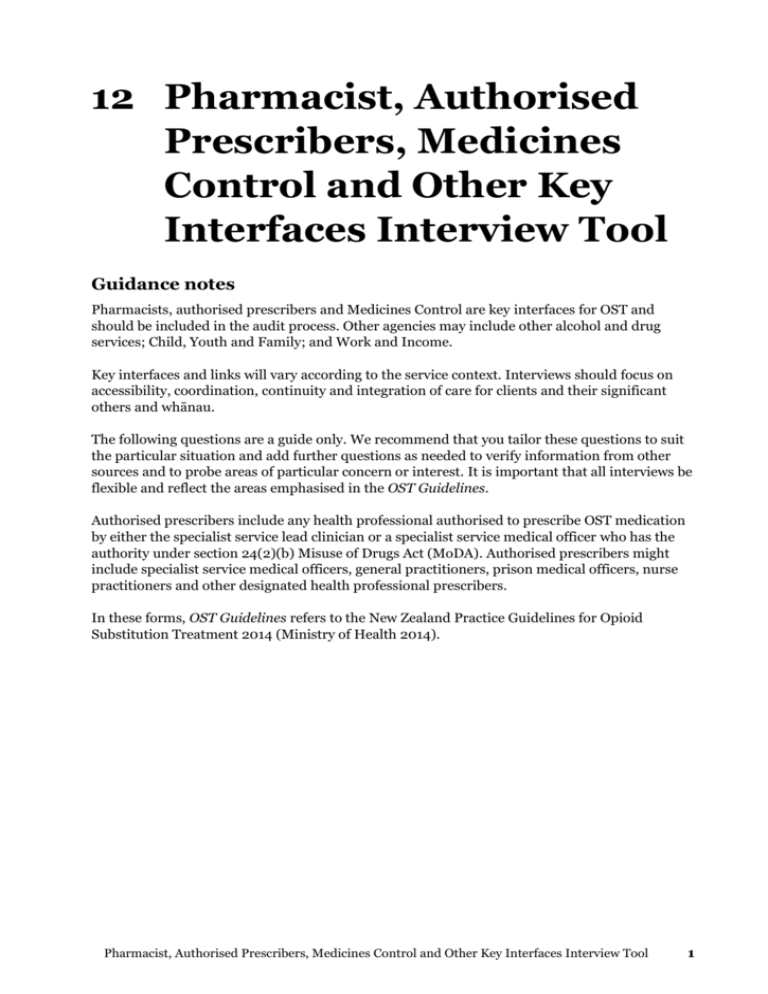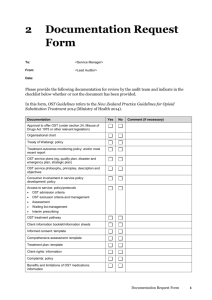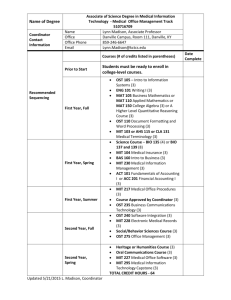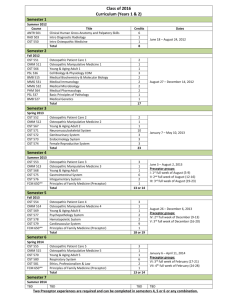12 Pharmacist, Authorised Prescribers, Medicines Control and Other
advertisement

12 Pharmacist, Authorised Prescribers, Medicines Control and Other Key Interfaces Interview Tool Guidance notes Pharmacists, authorised prescribers and Medicines Control are key interfaces for OST and should be included in the audit process. Other agencies may include other alcohol and drug services; Child, Youth and Family; and Work and Income. Key interfaces and links will vary according to the service context. Interviews should focus on accessibility, coordination, continuity and integration of care for clients and their significant others and whānau. The following questions are a guide only. We recommend that you tailor these questions to suit the particular situation and add further questions as needed to verify information from other sources and to probe areas of particular concern or interest. It is important that all interviews be flexible and reflect the areas emphasised in the OST Guidelines. Authorised prescribers include any health professional authorised to prescribe OST medication by either the specialist service lead clinician or a specialist service medical officer who has the authority under section 24(2)(b) Misuse of Drugs Act (MoDA). Authorised prescribers might include specialist service medical officers, general practitioners, prison medical officers, nurse practitioners and other designated health professional prescribers. In these forms, OST Guidelines refers to the New Zealand Practice Guidelines for Opioid Substitution Treatment 2014 (Ministry of Health 2014). Pharmacist, Authorised Prescribers, Medicines Control and Other Key Interfaces Interview Tool 1 12.1 Pharmacist interview tool Interviewee: Contact details: Designation: OST service: Auditor: Date: a. Context How many people attend your pharmacy for OST medication? How long have you been involved in OST? b. Support and training Can you outline the training you have received specifically in relation to OST? How helpful was the training? Do you have any suggestions for improving the training? How familiar are you with the New Zealand Practice Guidelines for Opioid Substitution Treatment (Ministry of Health 2014)? How would you describe the relationship between your pharmacy and the OST specialist service? What are the key strengths? What are the limitations? How would you describe the relationship between your pharmacy and the authorised prescribers involved in providing OST? What are the key strengths? What are the limitations? Do you have any concerns around the OST service’s support for authorised prescribers providing OST? Do authorised prescribers generally follow local and national OST Guidelines with respect to prescribing OST? How effective is the system for after-hours support from the OST service? c. Practice issues How regularly are you consulted about OST for the clients who attend your pharmacy? Are the OST service’s policies and procedures in relation to medication dispensing and administration clear and workable? Do you have any concerns about your role in OST? Are there any other matters that you would like to be considered as part of this audit? 2 Pharmacist, Authorised Prescribers, Medicines Control and Other Key Interfaces Interview Tool 12.2 Authorised prescribers interview tool Interviewee: Contact details: Designation: OST service: Auditor: Date: a. Context How many people are you providing OST for? How long have you been involved in OST? b. Support and training Can you outline the training you have received specifically in relation to OST? How helpful was the training in preparing you for your role in OST? Do you have any suggestions for improving the training? How familiar are you with the OST Guidelines? How would you describe the relationship between your practice and the OST specialist service? What are the key strengths? What are the limitations? How would you describe the relationship between your practice and the pharmacies involved in OST? What are the key strengths? What are the limitations? How effective is the system for after-hours support from the OST service? c. Practice issues How well are the policies and procedures working for transferring client care to and from the OST service? Is there a satisfactory level of support and timely consultation (for example, regarding client management issues) from the OST service? Do you have regular contact with staff from the specialist service? How helpful is this? How do you manage the reporting requirements with the OST service? Are other staff members of your practice (for example, the receptionist, the practice nurse) involved with the clients and their significant others/whānau? Do you involve significant others/whānau of the client? How do you ensure that clients have access to psychosocial support and services? Are there any other matters that you would like to be considered as part of this audit? Pharmacist, Authorised Prescribers, Medicines Control and Other Key Interfaces Interview Tool 3 12.3 Medicines control interview tool Interviewee: Contact details: Designation: OST service: Auditor: Date: a. General prescribing practices within the specialist service / other provider Do you have any concerns? b. Authorisation of prescribers Are there any quality issues related to training/education, supervision or treatment? c. Liaising with pharmacists Are there any quality issues regarding training/education in relation to treatment? d. Meetings with OST services / other prescribers What is working well? What could be improved? Are there any particular issues / concerns / critical incidents? Are there any areas for joint development or review? e. Overall delivery of treatment What is the quality of treatment / care provided? What are the strengths and limitations of that treatment / care? Do you have any particular issues, concerns or critical incidents that you wish to raise? Are there any themes or issues about the service provided that require development or review? Are there any other matters that you wish to discuss? 4 Pharmacist, Authorised Prescribers, Medicines Control and Other Key Interfaces Interview Tool 12.4 Other key interfaces/links interview tool Interviewee: Contact details: Designation: OST service: Auditor: Date: What is the quality of your working relationship with the OST service? In terms of policies and procedures, protocols/guidelines, etc, what is working well and what could be improved? Are the memorandums of understanding with the service and interface protocols adequate? What consultation/liaison mechanisms are in place? Do you have any comments on the quality of treatment/care provided? Are there any gaps? Have there been any critical incidents? Are there areas or themes that have emerged that require joint development or review? Do you have any particular issues/concerns? Pharmacist, Authorised Prescribers, Medicines Control and Other Key Interfaces Interview Tool 5








